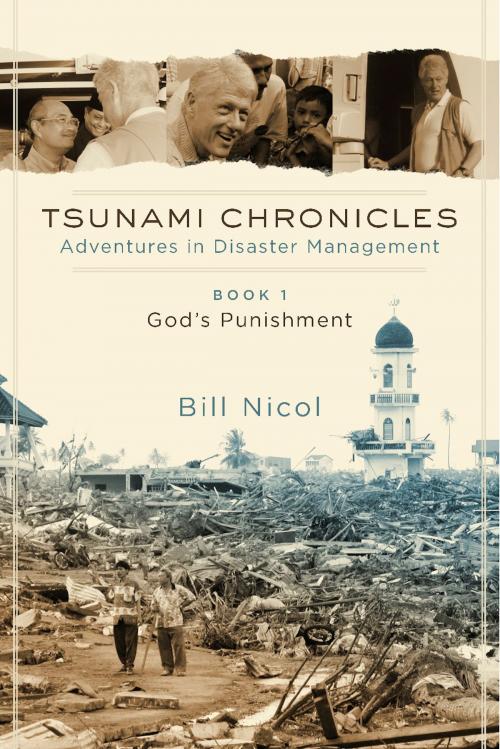| Author: | Bill Nicol | ISBN: | 9781483503028 |
| Publisher: | BookBaby | Publication: | July 1, 2013 |
| Imprint: | Language: | English |
| Author: | Bill Nicol |
| ISBN: | 9781483503028 |
| Publisher: | BookBaby |
| Publication: | July 1, 2013 |
| Imprint: | |
| Language: | English |
Few natural disasters come bigger than the 2004 tsunami. It left a trail of destruction from one side of the Indian Ocean to the other. Hardest hit was Aceh in Indonesia’s west where the tsunami killed almost a quarter of a million people, left half a million homeless and destroyed swathes of infrastructure. The global community responded like never before with the largest humanitarian military deployment since World War II plus billions in private and public charity. Four years later, Aceh had been rebuilt from the ground up. It was one of the world’s fastest and most successful disaster recovery programs, a stunning achievement. How did it succeed when so many fail? What can we learn from this? The world has been waiting for the answers. We now have them. "Tsunami Chronicles: Adventures in Disaster Management" is a series of six magnificent books that tells the inside story of Aceh’s recovery. A powerful first-hand account by a key insider, they lay bare the tectonic political and managerial forces that swept the rebuilding program and explain how they were tamed. The first book in the series, “God’s Punishment”, sets the scene. The massive damage. The global response led by the United Nations and World Bank. Indonesia’s rejoinder—ending 30 years of civil war, creating a purpose-built recovery agency, the politics that almost destroyed it from the start. Such were the foundations of recovery. The practical and political blended as one, the great theme of all to follow. Above all, this is a story of inspired leadership—global leadership in response to the humanitarian tragedy, military leadership that brought peace to a land in conflict, political leadership that cleared the way for recovery and individual leadership that laid the foundations for success despite dark opposing forces. “God’s Punishment” and the wider series are an epic work of journalism, a critical study of management and a detailed appreciation of a new national leadership paradigm that gained a fingernail grip in Indonesia. An unofficial history, both the book and series reveal the keen eye of a dedicated international humanitarian, writer, journalist and consultant inspired to unpack and explain what really happened. They are a breath of fresh air that sweeps away the cobwebs of dreary government reviews, misdirected lessons and limited media reporting. In an era when global warming and climate change threaten the world with unimaginable large-scale disaster, “Tsunami Chronicles” offers a cornerstone for renewed reflections on the reality of disaster risk reduction, emergency response and recovery, disaster planning and leadership in disaster management.
Few natural disasters come bigger than the 2004 tsunami. It left a trail of destruction from one side of the Indian Ocean to the other. Hardest hit was Aceh in Indonesia’s west where the tsunami killed almost a quarter of a million people, left half a million homeless and destroyed swathes of infrastructure. The global community responded like never before with the largest humanitarian military deployment since World War II plus billions in private and public charity. Four years later, Aceh had been rebuilt from the ground up. It was one of the world’s fastest and most successful disaster recovery programs, a stunning achievement. How did it succeed when so many fail? What can we learn from this? The world has been waiting for the answers. We now have them. "Tsunami Chronicles: Adventures in Disaster Management" is a series of six magnificent books that tells the inside story of Aceh’s recovery. A powerful first-hand account by a key insider, they lay bare the tectonic political and managerial forces that swept the rebuilding program and explain how they were tamed. The first book in the series, “God’s Punishment”, sets the scene. The massive damage. The global response led by the United Nations and World Bank. Indonesia’s rejoinder—ending 30 years of civil war, creating a purpose-built recovery agency, the politics that almost destroyed it from the start. Such were the foundations of recovery. The practical and political blended as one, the great theme of all to follow. Above all, this is a story of inspired leadership—global leadership in response to the humanitarian tragedy, military leadership that brought peace to a land in conflict, political leadership that cleared the way for recovery and individual leadership that laid the foundations for success despite dark opposing forces. “God’s Punishment” and the wider series are an epic work of journalism, a critical study of management and a detailed appreciation of a new national leadership paradigm that gained a fingernail grip in Indonesia. An unofficial history, both the book and series reveal the keen eye of a dedicated international humanitarian, writer, journalist and consultant inspired to unpack and explain what really happened. They are a breath of fresh air that sweeps away the cobwebs of dreary government reviews, misdirected lessons and limited media reporting. In an era when global warming and climate change threaten the world with unimaginable large-scale disaster, “Tsunami Chronicles” offers a cornerstone for renewed reflections on the reality of disaster risk reduction, emergency response and recovery, disaster planning and leadership in disaster management.















